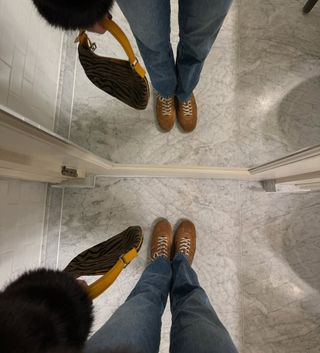
A week ago, Starbucks’ new CEO, Brian Niccol, was described as the “messiah” that the ailing coffee giant was looking for.
The mere announcement that the former CEO of Chipotle had a new job drove Starbucks’ stock up 25%– the greatest surge in value in the company’s history.
Niccol, who has a track record of success in turning around companies that have hit a rough patch, including Taco Bell and, most recently, Chipotle, is due to start at Starbucks on September 9.
So far, so good.
But in the last few days the good news has been overshadowed by a public backlash over perks in his contract that allow him to work remotely from his home in Newport Beach, California, and commute to the company’s HQ in Seattle via private jet.
In Starbucks’ offer letter to Niccol, the company said: “During your employment with the company, you will not be required to relocate to the company’s headquarters … You agree to commute from your residence to the company’s headquarters (and engage in other business travel) as is required to perform your duties and responsibilities.”
The document also states that he will be eligible to use the company’s aircraft for “business related travel” and for “travel between [his] city of residence and the company’s headquarters”.
A Starbucks spokesperson clarified to CNBC that its new chief will still be expected to work from Starbucks’ Seattle office at least three days a week in line with the company’s hybrid work policies.
Yet, instead of extinguishing the fire, the announcements only stoked the flames. By Thursday, The New York Times weighed in with a sarcastic headline. The BBC even produced a map of his commute.
Niccol’s commute had taken on a media life of its own.
‘What a bunch of performative hypocrites’
Some consumers have (wrongly) drawn the conclusion that Niccol, who is based in California and isn’t required to relocate to Seattle, will be using the company jet on a daily basis to get to work.
Although the company denied to the BBC that Niccol will be expected to fly back and forth over 1,000 miles each day, the public has gone into overdrive, blasting his “hypocritical” commute given the company’s recent sustainability commitments, including a ban on plastic straws. According to a 2021 report by the European Federation for Transport and Environment, private jets are up to 14 times more polluting, per passenger, than commercial planes and 50 times more polluting than trains.
“Starbucks CEO has decided to travel on a private jet for work instead of relocating. Meanwhile, we are supposed to save the environment and have our coffee with a paper straw that gets soggy in minutes,” one social media user wrote on X, the platform formerly known as Twitter.
One user joked: “Looks like we’ll have to use a lot more of reusable cups and paper straws to ‘offset’ the new Starbucks CEO’s humongous carbon footprint.”
“What a bunch of performative hypocrites with their enviro friendly branding. No company who truly cares about the climate would agree to this,” chimed another.
“If this man is commuting regularly on a private jet, do not let @Starbucks convince you they are environmentally conscious,” another wrote. “They get on us commoners about our cars but things like private jets and yachts do way more damage to the environment per unit.”
Starbucks declined to comment on accusations that it is being hypocritical by pushing its customers to use paper straws, all the while its CEO has access to the company jet.
“Niccol has proven himself to be one of the most effective leaders in our industry, generating significant financial returns over many years,” a spokesperson for the company told Fortune. “We’re confident in his experience and ability to serve as the leader of our global business and brand, delivering long-term, enduring value for our partners, customers and shareholders.”
The public will forget Starbucks’ hypocrisy—its workers won’t
Ben Alalouff, chief strategy officer at the marketing agency Live & Breathe, thinks that while the public backlash will blow in a matter of days, Starbucks’ workers won’t forget the news so quickly.
“If I was a Starbucks employee at corporate and I heard that a huge amount of costs every month is being used [to fuel a private jet] rather than investing into the workforce or investing into benefits or bonuses or whatever it may be, I’d be pretty pissed off,” he told Fortune.
As well as the anger directed at Starbucks from environmentally conscious consumers, others on social media have been quick to highlight the inconsistency with Starbucks’ decision to require office workers to return to the office at least three days a week.
Unlike Niccol, those who live far from the office (on a fraction of their boss’ salary) will have had to choose between relocating to meet the company’s in-office requirements or finding alternative work.
It’s probably a 9-day wonder
In the long run, however, Alalouff thinks the Starbucks brand will be fine.
“I think it is too large of a brand and it’s too much of a small issue in the plethora of things that are wrong with the world,” Alalouff tells Fortune. “No one’s going to change their coffee habits long-term based on the fact that the CEO is on a jet three days a week.”
“It’ll be this week’s interesting, ridiculous behaviour by an executive … But I think the worry would be internally,” he adds.
“I totally understand stretching and accommodating talent that’s going to be transformative to your business. But I think this one probably goes a tad too far.”
Niccol’s arrangements are pretty common. As few as 7% of CEOs are back in the office full-time (despite a quarter of them believing that a return to the office full-time is a priority).
Unsurprisingly, the double standard isn’t going unnoticed by employees who are often responding to rigid RTO mandates with resignation letters—or sticking around but putting in minimal effort and finding ways to flout the rules.
In his eyes, Starbucks will have to spend the next 6 months making the company “look rosy” to get buy-in from both its employees and customers.
“The longer this new CEO goes without making a huge impact that’s noticeable internally as well as externally, the worse this decision will look,” Alalouff concludes.
























